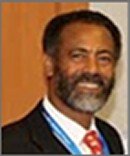

Plenary Lecture
Advances, Challenges and Shortcomings of Epilepsy Drug Treatment

Dr. Hundie Tesfaye
Department of Medical Chemistry and Clinical Biochemistry
Division of Clinical Pharmacology
Faculty Hospital in Motol
2nd Faculty of Medicine
Charles University
Prague, Czech Republic
E-mail: hundie.tesfaye@fnmotol.cz
Abstract: Epilepsy is the group name for convulsion symptom arising from neural organized function deficits originated within or outside the brain. Since considerable number (around 50million people) of the World population of all ages is affected, it is one of health care problems worldwide. Many drugs have been used in the past to relive symptoms by inducing changes in permeability to specific ions thus to stabilize membranes and interfering with release of neurotransmitters or other mechanisms. Nowadays, there are more drugs, but no one is developed for causal therapy as classification of epilepsy itself is very complex despite advanced technology utilization for diagnostic strategies. Although there is continuous emergence of new agents, pharmacoresistant symptom and adverse reactions including drug-drug interactions continue to challenge. Hardly preventable adverse effects (gastrointestinal, mental, or behavioural, neurologic or less commonly dermatological, haematological, hepatological) by some agents may lead to reduction of quality of life, whereas some agents are known teratogens. In spite of significant all developments in the field, no drug is considered as causal therapy for epilepsy to date. Thus the aim of antiepileptic drug prescription after management of emergency situation like status epilepticus is prophylactic rather than therapeutic. The purpose of this paper is to emphasize practical challenges and shortcomings associated with old and new antiepileptic drugs (AEDs).The paper also discusses the importance of therapeutic drug monitoring with very qualified interpretation and close interdisciplinary work of clinician and laboratories determining the drug plasma levels. Some case studies are purposely included in the paper as useful demonstration, how therapeutic drug monitoring is of vital importance in very challenging situations of epilepsy management.
Brief Biography of the Speaker: The author is MD, and PhD graduate of the Charles University, in Prague. Trained as Paediatrician and later as Clinical Pharmacologist, holds Board Certificate from the Institute for Postgraduate Education in Medicine. His present position is consultant in clinical pharmacology at the faculty hospital. The main interest and consultancy area of the author is in particular therapeutic drug monitoring in needy patients including, paediatric and geriatric populations given their pharmacokinetic/pharmacodynamic differences and vulnerability. The author participated in bioequivalence studies and clinical trials including as principal investigator and co-investigator. He is also dedicated to aid dosage adjustment for transplantation patients, oncology patients and others in intensive care including those with renal failure. The author participates in pregraduate and post graduate education both as a faculty member and as invited speaker in the field of clinical pharmacology dedicated for safe and better use of medicines for human wellbeing.